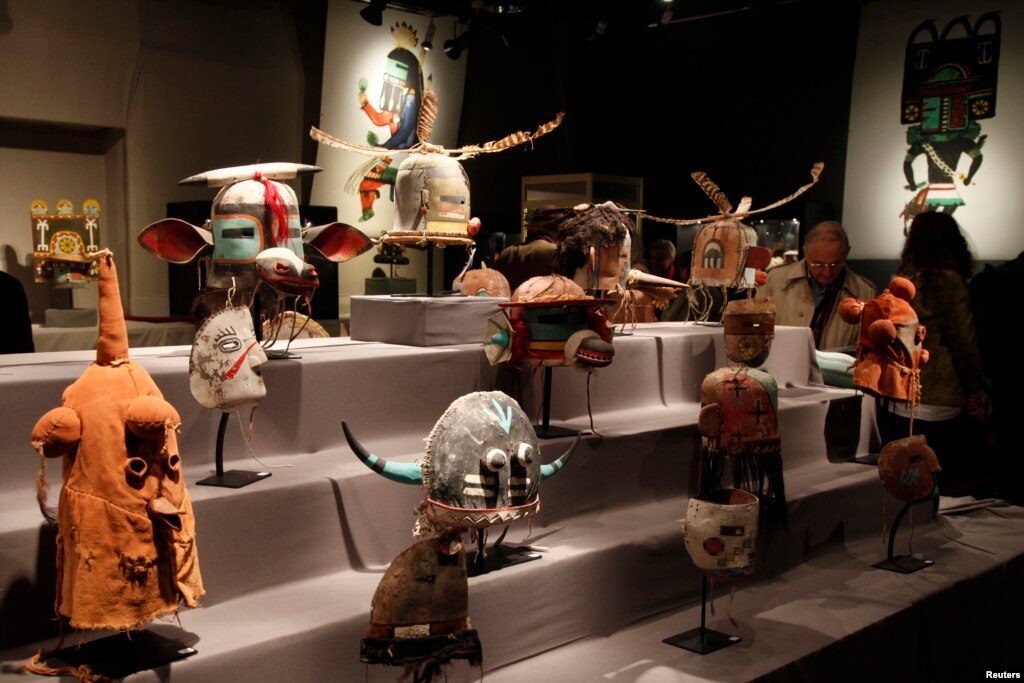
The Los Angeles
Annenberg foundation
turns out to be one of the mysterious bidders in
another controversial Paris auction of sacred Native American artifacts, this time selling off 24 antique masks from the Hopi and 3 from the San Carlos Apache tribes based in Arizona. A French court ruled last December that
an earlier contested auction could legally proceed, and in this case, the French court ruled similarly.
As reported at this blog, tribal members and supporters protested in France last April, since the masks - also known as Katsinam - are held by indigenous peoples to be real, sacred beings with a value that precludes sale as art. The Katsinam
are also described as stolen during the early 20th century.
In a surprising twist of good news though, the kind that restores faith in humanity, it turns out that the charitable Annenberg organization intended all along to restore these pieces to the tribes in question - and had moved in on the auction with exactly that purpose. A suspenseful short story, whereby secret French and English-speaking operatives, along with the tribes' attorney (via
Survival International), collaboratively triumphed in the bidding war, ultimately making off with 21 Hopi artifacts and all three San Carlos Apache for 530,000 dollars.
In further good news, one of the three remaining artifacts was incidentally purchased by a private couple also intending to repatriate their acquisition to the Hopi.
The masks
were made during the 19th and early 20th century. Like many of the artifacts in dispute, they are used in religious ceremonies and eventually "retired or left to disintegrate naturally." One Hopi protester
said in April that children are not even supposed to look at them, and some websites report that display in photographs and media is offensive, though the images have been widely circulating throughout the internet.
Robert Redford
leveraged his well-known voice in the protests, calling the auctions, "criminal."
From Huffpost:
The U.S. Embassy had also called for a delay so that tribal
representatives could come to France to identify the artifacts and
investigate whether they have a claim under the 1970 UNESCO Convention
on the Export and Transfer of Ownership of Cultural Property, to which
both France and the U.S. are signatories.
A widely noticed and magnificent
Angwusnasomtaqa or
Tumas Crow Mother,
shown here in April's post, and variously reported as sold for
171,000 or
210,000
dollars, was among those acquired at the earlier auction in April when Reuters described another mysterious collector who suggested that he might one day "give some back."
Unfortunately, that was not an Annenberg operative.
As for this caper, if you will,
Hopi katsina priest Sam Tenakhongva thanked Annenberg, attorney Pierre Servan-Schreibert, and Survival International,
while asserting that no one should "have to buy back their sacred property."
“Hopefully," he said, "this gesture [of Annenberg's] is the beginning of a larger conversation to
discuss and inform various communities about what is sacred and what is
for sale. Although we were disappointed in the
decision of the court which allowed the sale to proceed, we will
continue to work to protect our cultural heritage on behalf of our Hopi
people and others." He added, "Our hope is that this act sets an example for others that items of
significant cultural and religious value can only be properly cared for
by those vested with the proper knowledge and responsibility. They
simply cannot be put up for sale."
Annenberg reports that the Native American Graves Protection and Repatriation Act gives
federally recognized Native American tribes a way to reclaim "funerary objects from federal agencies and museums in the U.S.," but that the law does not apply to items held
internationally.
The Navajo Observer reported on December 10th
that 6 similarly contested items from the Zuni tribe in New Mexico were also up for sale
at the December 9th and 11th Paris auctions at Eve Auction
House.
*Photo credit/via Voice of America/Reuters, Following a French court's ruling, Hopi and San Carlos Apache masks are displayed at an auction house in Paris, April 11, 2013. Most will be returned to the groups following purchases by the Annenberg Foundation and a private couple.


